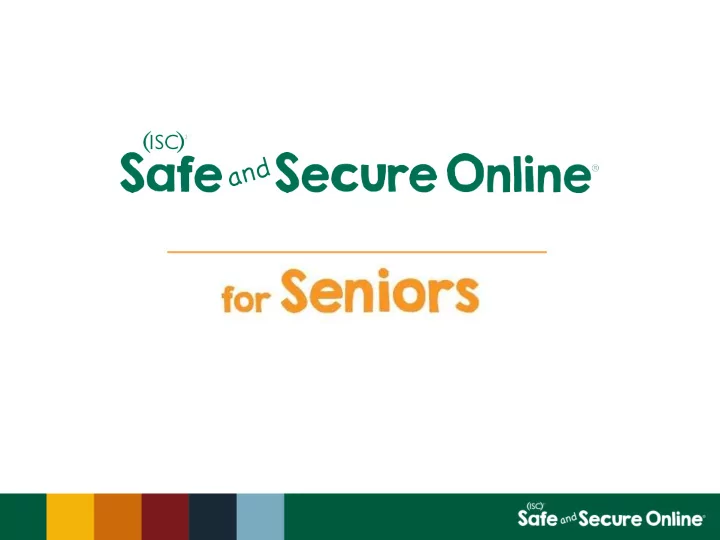

This presentation has been created by the Center for Cyber Safety and Education with the help of the world’s leading cybersecurity professionals: the certified global members of (ISC) 2 .
Expectations Awareness
About You Do you mostly ... Connect with other people? Bank and shop? Watch movies and play games? What else do you do?
UNDERSTANDING THE CYBERWORLD Digital Immigrants vs Digital Natives
START WITH THE BASICS Knowing basic terminology will help you navigate the internet safely PHISHING MALWARE CLOUD WIFI APP
MALWARE PROTECTION Get anti-virus and keep it updated!
SECURITY UPDATES • Operating System • Internet Browser • Software • Anti-virus
SAFE PASSWORDS Create Strong Passwords Combine lower case, upper case, numbers, and special characters Try a “Passphrase” Longer and stronger than a password
CREATING A PASSPHRASE safe and secure I am safe and secure online IamSafeandSecureOnline IamS@f3@nd$ecur3Online!
PASSWORDS EVERYWHERE. P@$$WORD T!P: Use passwords on lock screens for all mobile devices and computers
PASSWORD VAULTS Store all passwords in a • secure location Don’t have to remember • passwords
OPEN Wi-Fi • Connect with caution • Do not auto-connect • Avoid banking • Avoid checking e-mail • Avoid making purchases
ONLINE SHOPPING AND BANKING https://www.yourbank.com/ • Be sure you are on a real, secure site before entering personal information, including credit card numbers. • Never bank or shop on open Wi-Fi Never bank or shop on open Wi-Fi • Banks will not ask for your credit card or password information • • via e-mail. • Ensure you use strong, unique passwords for financial and shopping sites.
SCAMS Fake Emergencies • False Promises • Fabricated Prizes • Bogus Investments • Deceptive Money Offers • Phony Lotteries • And more….
COMPUTER COLD CALLING SCAM Someone calls and asks to take control of your device to help you. “Your computer has a virus. I’m calling to help. Please go to our website and download the tool so I can fix it for you.”
RANSOMWARE SCAM A scare tactic that takes control of your device or files; designed to scare you into sending money to get your access back. WARNING Your personal files are encrypted. In order to obtain the private key to restore access, you need to pay $300. Private Key will be destroyed. Time Left NEXT 01: 05: 02
ADVANCED FEE SCAM Convinces you that in return for sending money in order to help someone, you will receive even more money eventually “I am a prince and my father left me $40 million in his will, but I have to first bribe government officials to get it out.”
STRANDED TRAVELER SCAM Appears to be coming from a family member or a friend, but really is coming from a criminal trying to convince you to send money. “Please help me! My wallet and has been stolen and if I don’t pay the hotel right now, they will arrest me!”
SCAM VICTIM ACTION PLAN 1. Collect your thoughts and remain calm. 2. Change your passwords. 3. Make a list of all information that was stolen. 4. Track all communications. 5. Obtain a copy of your credit report and review it. 6. Notify credit card companies and financial institutions. 7. Contact your local law enforcement. !
SAFE EMAIL HABITS Never follow links or • @ instructions from unknown or untrusted sources Never send sensitive • information through e-mail Log out when you are finished •
PHISHING A malicious attempt to acquire sensitive information by pretending to be a trustworthy source and using fake bait to catch victims.
PHISHING EXAMPLE Best Bank customer5319 http://NotYourBank.com Ctrl+Click to follow link
QUESTION WHAT YOU SEE
BACK-UP YOUR DATA! This is extremely important—but, easy todo. • Use an external portable storage device or cloud services • Backup your data daily or weekly
DOWNLOADS AND STREAMING Use Reputable Sites Only! • Download Music • Watch Movies • Download Apps • Stream Television • Play Games
SOCIAL MEDIA • Get permission before posting pictures of others • Do not put sensitive information on social media • Do not post that you are going out of town • What goes on the internet, stays on the internet
PICTURES • Stop and Think before posting pictures - Does this reveal personal information? • Do not post pictures while still on vacation • Look in the background of photos too • Deactivate geotagging from your photos
DEACTIVATE GEOTAGGING • Only deactivate geolocation from pictures • Leave other geolocation apps and services in place • Check with your cellphone provider for instructions on how you can change the setting on your specific device
RECAP: TOP TIPS 1. Think before you click. 2. Get anti-virus protection and keep it updated. 3. Keep your computer software and device apps updated. 4. Back-up your pictures and documents. 5. Create strong, unique passwords for every site. 6. Be careful on public Wi-Fi connections. 7. Question what you see in e-mails and pop-ups. 8. Download and stream from proper sites only. 9. Do not post sensitive information on social media sites. 10. Be mindful of e-mail and phone call fraud attempts.
QUESTIONS? SafeandSecureOnline.org
Recommend
More recommend